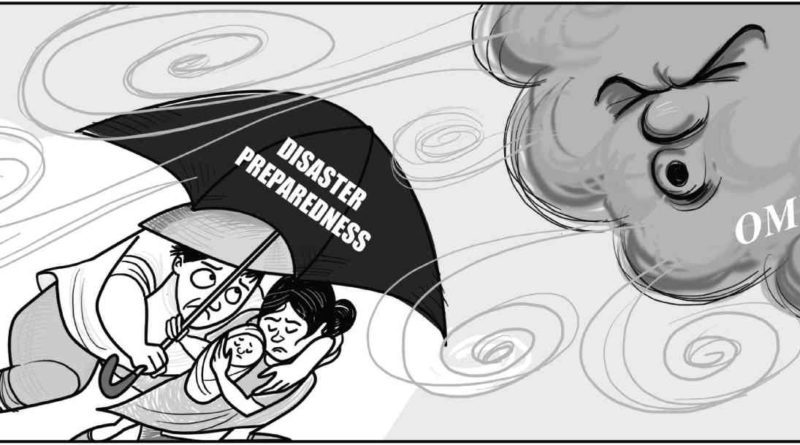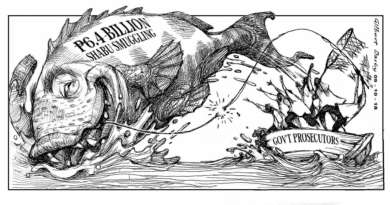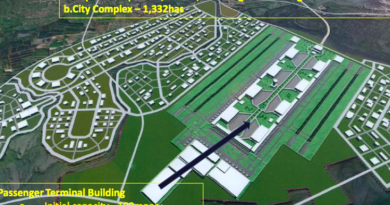OP ED EDITORIAL & CARTOONS: War on truth
Over the last months or so, several studies have emerged showing how the social networking site Facebook was “weaponized” during the 2016 elections.
For sure, all of the candidates for different posts utilized the internet, including FB, to reach potential voters. But none was as organized, focused and better funded, as well as cynical about the “facts” they sought to spread, than the organization behind the on-again, off-again candidacy of Rodrigo Duterte, mayor of the city of Davao.
.
– SPACE RESERVE FOR YOUR ADVERTISEMENT –
.
Throughout his political career, Mr. Duterte had marketed himself, in the words of media analyst Jack Swearingen, as “the tough-on-crime, anti-elite Everyman ready to bring back jobs and order.”
In speeches and freewheeling interviews, the supposedly reluctant candidate bombarded the once-benign social network site, as well as the traditional mass media, with vicious attacks on opponents, along with alarmist scenarios, offensive remarks aimed at women, and promises of a bloody war on drugs.
.
– SPACE RESERVE FOR YOUR ADVERTISEMENT –
.
Sure enough, the number of his adherents grew by leaps and bounds since “any inflammatory content… (does) extremely well on Facebook,” said Swearingen, writing in New York magazine.
Mr. Duterte’s run for the highest post in the land — once deemed a long shot given his localized base of support and his relative anonymity in a field jammed with political heavyweights with a national constituency — was given a huge boost by a tactical business decision that FB made in 2013, three years before the elections.
That year, FB decided to “subsidize internet access to Facebook on mobile devices where cellular data was pricey, physical internet infrastructure was poor, and the smartphone revolution meant many leapfrogged from having no internet access at all to using their smartphone as their only source to the web.”
The Philippines, so FB officials found, “was the perfect country to test this out on,” calling the experiment “Free Facebook.”
When Mr. Duterte finally decided to become a serious presidential candidate, he had a ready platform to reach the millions of Filipino voters.
As Jonathan Corpus Ong of the University of Massachusetts Amherst wrote in Asia Global Online, “Duterte’s campaign machinery strategically focused on assembling bloggers, digital influencers, and fake account operators to tap into the public’s deep-seated anger — and convert these emotions into votes on election day… This tactic owed much of its success to the fact that the Philippines is the world’s ‘social media capital,’ with the average Filipino spending more time on social media than any other nationality.”
Other candidates still used the “traditional” avenues to reach out to voters: advertising, print and broadcast media, as well as the even more traditional rallies, motorcades, posters and personal huckstering, as well as the internet.
– SPACE RESERVE FOR YOUR ADVERTISEMENT –
.
But only Mr. Duterte had (and apparently still has) the organized army of cyberwarriors ready to jettison the rules of engagement, including laying waste to the truth and to history, to create an army of fanatical devotees.
It’s doubtful if this was the intent of FB founder Mark Zuckerberg, who started (with a few collaborators) the site as a way for Ivy League male students to “rate” women on campus, and then went on to expand it to a digital web of personal connections. Now he finds himself in the service of trolls, online bullies and fabulists.
Can FB executives, who’ve been forced to meet with authorities in other countries to explain their role in this disturbing development fomented by shadowy groups, still be able to put the foul toothpaste back in the tube? (The pro-Marcos campaign, for instance, has also had considerable success on social media with largely uncontested, obviously well-funded revisionist takes on history—something it couldn’t do in the past with the more rigorous-minded traditional media.)
Will laws and regulations change the way people receive and perceive what they read in the web? And will Filipinos still be able to discern truth from trickery?
.
“In the Philippines,” said Swearingen, “its Free Facebook program has become so successful that it’s hard to imagine how Facebook and the Philippines could ever untwine themselves from each other… And even after Duterte leaves office, whenever that may be, the Philippines will still be a country where one website’s algorithm determines what 97 percent of internet users look at.”
That’s a scary, deeply worrying scenario for the future of politics and society in this country.
..
7.1. No Z nation – Tribune – PH moved on from 63% inflation.
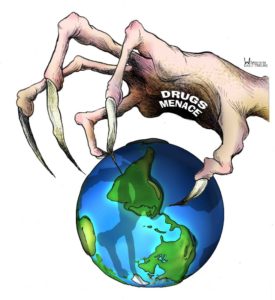
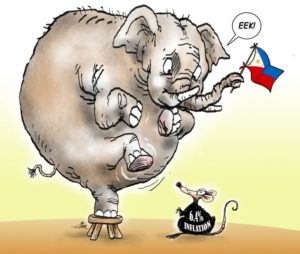
.
7.2. Manila Bulletin – See you on September 21
.
.
7.3. The Manila Standard – Backyard bullies

7.4. The Manila Times – ORATIO IMPERATA

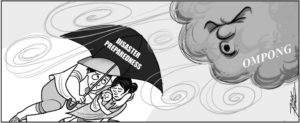
7.6 The Philippine Star – Coastal cleanup
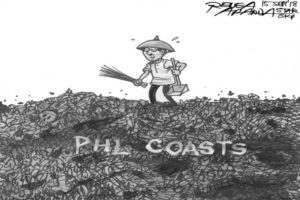
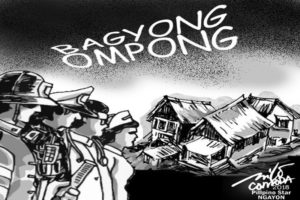

8.0. The Straits Times

The Straits Times says:
Widening the net for cashless dining
.
About 40 per cent of dining occasions take place at hawker centres, coffee shops and canteens. It is strange therefore that the ambit of the cashless society had yet to be extended comprehensively to the 12,000 stalls operating in such premises and which Singaporeans patronise every day. But that is set to change with the announcement that e-payment service provider Nets has been appointed to bring e-payments to such stalls with a single, unified system. While many outlets accept such payments, Nets will supply hawkers with hardware that can accept e-payments from 20 sources for a start. Nets will settle accounts with the hawkers, which means they no longer need to deal with different e-payment firms individually.
Entrenching e-commerce in the everyday lives of citizens brings many benefits for both traders and customers that are recognised internationally. The reduction of transaction costs figures high on that list. According to an analysis presented by the Centre for Effective Global Action, based in the United States, such electronic payments are convenient because they remove the need to travel physically to a bank to deposit money. This also increases security by, for example, making it more difficult for employees to steal. Indeed, e-commerce increases sales by capturing clients from businesses nearby that do not accept card payments. These marginal benefits are important in the retail sector.
TO READ THE FULL ARTICLE https://www.straitstimes.com/opinion/st-editorial/widening-the-net-for-cashless-dining
.
 All photographs, news, editorials, opinions, information, data, others have been taken from the Internet ..aseanews.net | [email protected] |.For comments, Email to :D’Equalizer | [email protected] | Contributor
All photographs, news, editorials, opinions, information, data, others have been taken from the Internet ..aseanews.net | [email protected] |.For comments, Email to :D’Equalizer | [email protected] | Contributor

